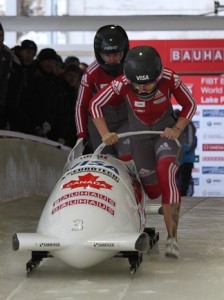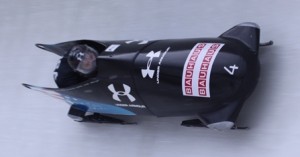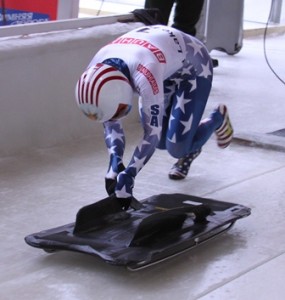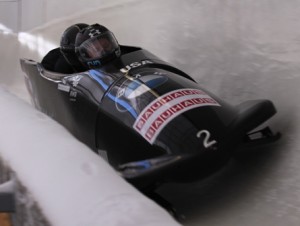
2012 FIBT World Championship Recap
There’s something to be said for having home track advantage in any racing sport, and it couldn’t have been more obvious in Lake Placid, New York for the 2012 FIBT World Championships.
With the Worlds at home, the US Bobsled & Skeleton Federation chose to keep some of their teams at home for the final two World Cup stops in Canada. Gold medal hopefuls in most disciplines stuck around Mount Van Hoevenberg for the better part of a month training, with hopes of making a great showing at the final race of the year. Notably, the USA-1s for the bulk of the year in two-man, four-man and women’s bobsled. The risk was minimal, as the World Cup hadn’t been good to the American teams. Between bad timing with snow and some otherwise not-so-good performances, no team was in contention for a World Cup championship.
Women’s Bobsled
The weekend started off right for North American teams, with Kaillie Humphries in CAN-1 dominating the women’s bobsled race. Humphries led from the get-go, and despite the  best efforts of Germany’s Sandra Kiriasis, sailed to victory. Kiriasis took silver after a disappointing fourth run by Elana Meyers in USA-1 left her with bronze. German Cathleen Martini took fourth, with Helen Upperton finishing fifth after starting last. Swiss slider Fabienne Meyer finished sixth. This would be the last time that the United States would not score a gold medal until the following Saturday.
best efforts of Germany’s Sandra Kiriasis, sailed to victory. Kiriasis took silver after a disappointing fourth run by Elana Meyers in USA-1 left her with bronze. German Cathleen Martini took fourth, with Helen Upperton finishing fifth after starting last. Swiss slider Fabienne Meyer finished sixth. This would be the last time that the United States would not score a gold medal until the following Saturday.
Two-Man Bobsled
Men’s bobsled this season had been relatively strange, with different champions in two-man, four-man, and overall. Two-man World Cup champion Beat Hefti came in as a presumptive favorite, but it would be North Americans Steven Holcomb and Lyndon Rush having the final dual on the track.
Rush and CAN-1 took to the track third in heat 1, and their time of 55.71 would set the pace early. Nobody after them would even as much as challenge, and going into heat 2 Rush had a .07 lead over Max Arndt, the overall bobsled World Cup champion. Holcomb’s rough first run left him fourth, tied with Latvian Oskars Melbardis.
The second run was disastrous for the Germans.. The USA-1 sled ran clean in heat 2,  while the German sled of Arndt was over a quarter-second off of the American’s pace with a bumpy run, moving Arndt back and Holcomb up to the silver medal position. Rush’s consistent run left him the leader, but only .12 ahead of Holcomb.
while the German sled of Arndt was over a quarter-second off of the American’s pace with a bumpy run, moving Arndt back and Holcomb up to the silver medal position. Rush’s consistent run left him the leader, but only .12 ahead of Holcomb.
Heat 3 was where Holcomb made his move. A huge push and uneventful trip down the track for USA-1, combined with a fourth-fastest run for Lyndon rush moved the Americans to the lead. Holcomb and company wouldn’t look back in the fourth heat, making the quickest run of the heat and winning in convincing fashion. Lyndon Rush would finish second, just ahead of Max Arndt. Francesco Friedrich, Hefti and American John Napier would round out the top six two-man sleds. The win was the first ever two-man world championship for an American team.
Team Competition
The team competition is always an entertaining event when it’s held. With each discipline only getting one shot at making it down the mountain, the pressure is on for each athlete to do their best, because there’s no second run to make up lost time.
The first run was men’s skeleton. German Frank Rommel led the way for GER-1 early, but had Americans Matt Antoine (for USA-1) and John Daly (for USA-2) both within a tenth of a second of his lead going into women’s bobsled.
Crowned World Champion the day before, Kaillie Humpheries set a much-needed blistering pace in her run to overcome an eighth-fastest slide by John Fairbairn. That slide, combined with a fast slide by Mellisa Hollingsworth got the Canadian team up to third, but that’s as far as the lone Canadian team could make it.
The American teams did what they do best in the final two heats. Katie Uhlaender and the team of Steven Holcomb and Justin Olsen both made fastest runs in their disciplines, with Holcomb’s run clinching the race for the Americans. USA-1 took gold, while a consistent GER-1 team never had a run worse than fourth to take silver. The Canadians took bronze, while USA-2 finished .2 out of a medal.
Women’s Skeleton
Women’s skeleton races this season have been up in the air, with seemingly a half-dozen different sliders with a chance to win every week. The 2012 World Champion wouldn’t exactly come out of nowhere, but would come from the ranks of the 2011/2012 non-winners.
World Cup champion Shelley Rudman took the lead early, but had both Canadian Mellisa Hollingsworth and American Katie Uhlaender within two tenths behind her. Rudman’s second run would be disastrous, as the Brit would only have the eighth fastest run, over a half-second behind Uhlaender, and moving her into third place through two heats.
Hollingsworth and American Katie Uhlaender within two tenths behind her. Rudman’s second run would be disastrous, as the Brit would only have the eighth fastest run, over a half-second behind Uhlaender, and moving her into third place through two heats.
The final two heats were a dual between Uhlaender and Hollingsworth. The Canadian would make a faster run than the American in Heat 3, but only by .01, while Heat 4 was a tie for the two North Americans. Uhlaender’s faster runs on Thursday would be the difference, making it three gold medals in four events for the Americans. Hollingsworth would take silver for Canada.
Great Britain has come on strong in women’s skeleton over the last couple years, and that was on display throughout the event, with the UK putting four sliders into this year’s competition. Young standout Lizzy Yarnold took over, dominating the last two runs to pass by Rudman for bronze, while Amy Williams consistently moved forward, and finished the weekend in fifth place.
Men’s Skeleton
Martins Dukurs is good. Like, really good. It wasn’t a matter of “would the Latvian win”, but “by how much would the Latvian win?” The answer was by just over 2 seconds over Frank Rommel.
In his first run, Dukurs hit the wall at least a half-dozen times and still had over a two-tenths advantage over the German. From there the lead just continued to grow, first to .69 seconds, then to just over a second and a half, and then finally to 2.08, which would be the margin of victory from first to second.
The real battle was for third, where Ben Sandford, Sergei Chudinov and Matt Antoine were swapping positions after each heat. Tomass Dukurs had the bronze position after Heat 1, but had an awful Heat 2, moving Antoine from fourth to third. Antoine had consistent runs, but Sandford picked up the pace in day 2, making his big move in Heat 3 up to third. Antoine couldn’t respond and by the end of the race had slipped back to fifth, in a tie with Tomass Dukurs. Chudinov lingered around the top five, but never could make a move to the podium.
Four-Man Bobsled
The final event of the 2012 World Championships was four-man bobsled. The race was marred by disqualifications and did not finishes, with six sleds (including both USA-2 and CAN-2) not receiving credit for the race. Of the final 17 sleds to make all four runs, only three had a shot of winning: Steven Holcomb in USA-1 and the two German sleds, with Max Arndt and Manuel Machata in GER-1 and GER-2 respectively.
Once again Holcomb fell behind Arndt early, but this time by only .15 seconds. With snow picking up, Arndt’s second run of the day was a sloppy one, over a half-second slower than his first, and a clean run by Holcomb moved the USA-1 sled into first going into the final day of sliding by a hundredth of a second.
his first, and a clean run by Holcomb moved the USA-1 sled into first going into the final day of sliding by a hundredth of a second.
Holcomb would come into Heat 3 with everything on his side: An extra three weeks of training, home ice advantage, stronger pushes than any other team and a .01 advantage in timing. The .01 would be a moot point, as USA-1 would open up the lead by two tenths in Heat 3. Needing a high-54 second run in the final heat, Holcomb and company threw down the only sub-54 second run of the weekend, winning with a 53.99.
Holcomb’s win made it four gold medals and one bronze for the American teams, making a total of five overall. The Germans led the way in total medals with six, but no golds to show for an otherwise consistent weekend.
The 2013 FIBT World Championships will be held in St. Moritz, Switzerland.
| Nation | Gold | Silver | Bronze | Total |
| USA | 4 | 0 | 1 | 5 |
| CAN | 1 | 2 | 1 | 4 |
| LAT | 1 | 0 | 0 | 1 |
| GER | 0 | 4 | 2 | 6 |
| NZL | 0 | 0 | 1 | 1 |
| GBR | 0 | 0 | 1 | 1 |

